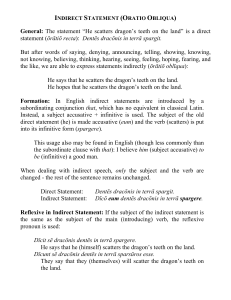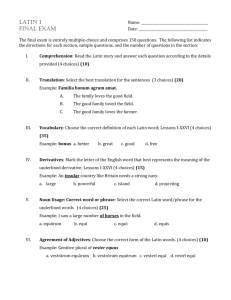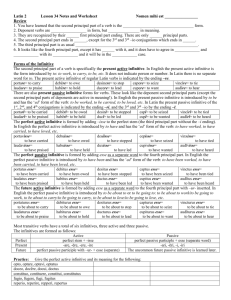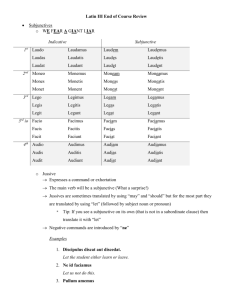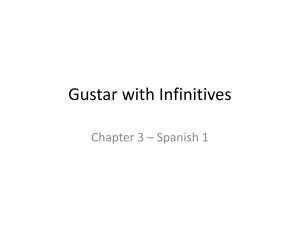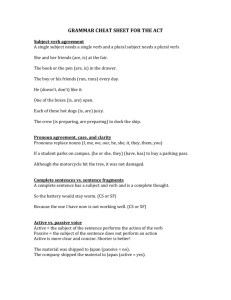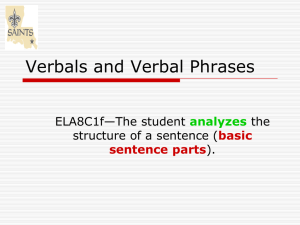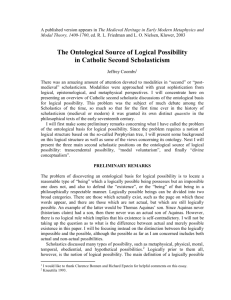Infinitives - WordPress.com
advertisement
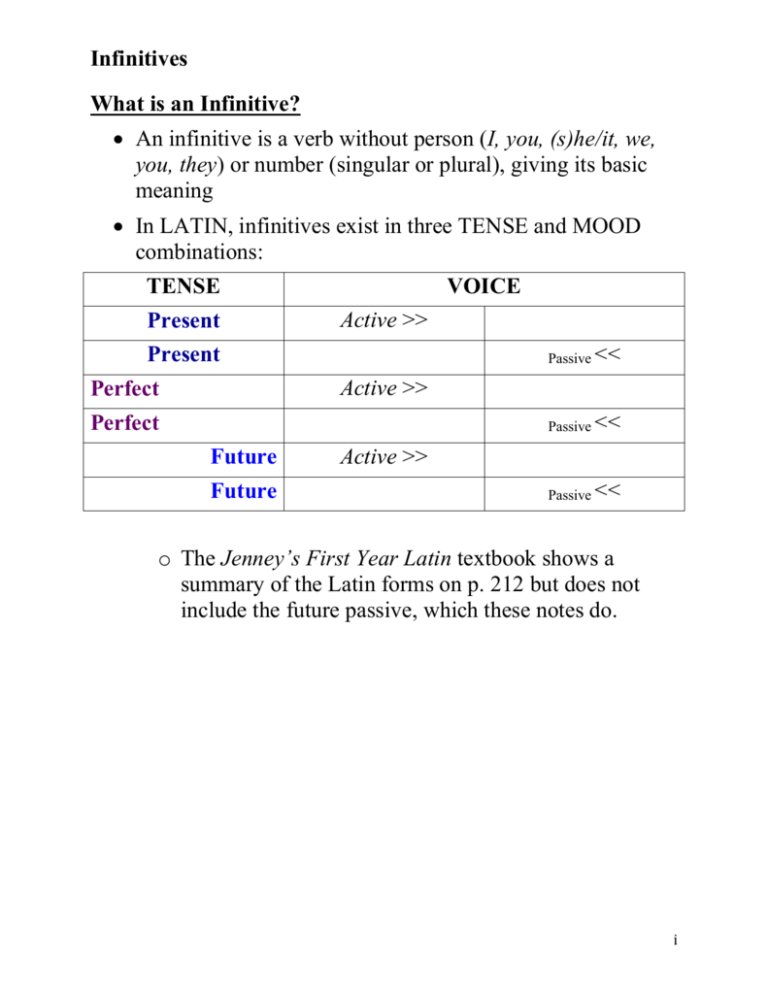
Infinitives What is an Infinitive? An infinitive is a verb without person (I, you, (s)he/it, we, you, they) or number (singular or plural), giving its basic meaning In LATIN, infinitives exist in three TENSE and MOOD combinations: TENSE Present VOICE Active >> Passive << Present Active >> Perfect Passive << Perfect Future Future Active >> Passive << o The Jenney’s First Year Latin textbook shows a summary of the Latin forms on p. 212 but does not include the future passive, which these notes do. i Infinitives Some major Functions of Infinitives Complementary: completes the action of an intransitive verb, such as o possum, debeō (when meaning “ought”) o dubitō (when meaning “hesitate”) o constituō (when meaning “decide”) o soleō (“to be accustomed”) o Examples: possumusne saltāre? “Can we dance?” debēs mihi narrāre. “You ought to tell me.” ubi constituēs discēdere ex oppidō? “When will you decide to leave town?” solēbam lūdere in silvā. “I was accustomed to play(ing) in the woods.” Subjective: the infinitive may be the subject of est and similar verbs, in apposition to the subject, or as a predicate nominative. o videre est crēdere. “To see is to believe.” o dolēre est malum. “To suffer is evil.” o necesse erit morī. “It will be necessary to die.” Objective: the infinitive may essentially be the direct object of a transitive verb. This sounds very similar to a complementary infinitive and, frankly, this is a distinction that is difficult to document in reference materials. o Verbs taking an infinitive with accusative subject, i.e. “[verb] someone (acc.) to do something (infinitive)” ii Infinitives iubeō, iubēre, iussī, issum – to order cogō, cogere, coēgī, coāctum – to force, compel prohibeō, prohibēre, prohibuī, prohibitum – to prohibit, prevent vetō, vetāre, vetuī, vetitum – to forbid o Examples: meī parentēs iussērunt mē lavāre mē. “My parents ordered me to wash myself.” mox novae legēs coēgerint illōs cīvēs habitāre locō alterō. “Soon the new laws will have forced those citizens to live in a new location.” nōlī prohibēre nōs discēdere! “Do not prevent us from leaving!” alter cōnsul semper vetāre alterum agere poterat. “The one consul was always able to prevent the other one from acting.” o Other commonly used transitive verbs that take an “objective” infinitive: amō, amāre, amāvī, amātum – to love, like temptō, temptāre, temptāvī, temptātum – to try, attempt cupiō, cupere, cupīvī, cupītum – to wish, want dēsīderō, dēsīderāre, dēsīderāvī, dēsīderātum – to desire volo, velle, voluī – to wish, want timeō, timēre, timuī - to fear, to be afraid (to) iii Infinitives o Examples: amāsne natāre in marī? “Do you like to swim in the sea? meus magister temptat docēre nōs Latīnam linguam. “My teacher is trying to teach us the Latin language.” ille centurio relinquere auxilia in provinciā cupīverat. “That centurion had wanted to leave reinforcements in the province.” nuquam cupiēmus dēsistere. “We will never want to stop.” paucī ex mīlitibus in Galliā voluērunt dēficere ex exercitū. “A few of the soldiers in Gaul wished to desert (from) the army.” timeō manēre domī (domī = locative case, showing “place where” instead of an ablative place where) sine custōdibus. “I am afraid to stay at home without guards.” Indirect Statement: the main verb of an indirect statement is written in the infinitive mood. o sciō tē audīre. “I know that you are listening.” o audīvistīne eōs ē lūdō discēdere? “Have you heard that they were leaving the school?” o dīcit lūdum esse hilārem. “She says that school is fun.” iv Infinitives Mechanics: How do I form and translate Latin infinitives? Present Active >> o RULE: the 2nd principal part of a verb is its present active infinitive o WATCH: necō, NECĀRE, necāvī, necātum Conjugation Latin English 1st necāre “to put to death” 2nd delēre “to destroy” 3rd caedere “to slaughter” interficere “to kill” sepelīre “to bury” adorīrī (passive in form) “to attack” (active in meaning) 3rd-IO 4th Deponent (3rd conj.) o CONTEXTUAL EXAMPLES: licetne mihi iam DISCĒDERE? “Is it permissible for me to leave now?” cūr temptās DIGREDĪ? “Why are you trying to step away?” nōn saepe amō sōlus nocte AMBULĀRE. “I don’t often like to walk alone at night.” nōlī mē PROHIBĒRE! “Do not prohibit me!” placet tibi mē RIDĒRE! “It pleases you to laugh at me!” v Infinitives Present Passive << o RULE: For all conjugations except 3rd + 3rd-IO, take the 2nd principal part and replace the final -e with -ī. For 3rd + 3rd-IO, take the 2nd principal part and replace the -ere with -ī. o WATCH: delēre – -e = delēr- + -ī = delērī interficere – -e = interfic- + -ī = interficī Conjugation Latin English 1st necārī “to be put to death” 2nd delērī “to be destroyed” 3rd caedī “to be slaughtered” 3rd-IO interficī “to be killed” 4th sepelīrī “to be buried” Deponent (3rd conj.) NA – since adorior, adorīrī, adortus sum is deponent verb, i.e. it uses passive forms to express action in the active voice, you must use a non-deponent verb to say “to be attacked” o CONTEXTUAL EXAMPLES: nēmō NECĀRĪ hodiē cupit. “Nobody wants to be killed today.” debēmus DOCĒRĪ ā meliōre magistrō quam tē. “We ought to be taught by a better teacher.” necesse est ossibus SEPELĪRĪ. “It is necessary for bones to be buried.” vetō cibum FERRĪ in meam cameram. “I forbid food to be brought in my room.” vi Infinitives Perfect Active >> o RULE: OPTION #1: Take the 3rd principal part of the verb and add -sse to the end. OPTION #2: Take the perfect stem of the verb and add –isse to the end. o WATCH: #1: cecīdī + -sse = cecīdisse* #2: cecīdī – ī = cecīd- + -isse = cecīdisse *N.B. The final –ī of the 3rd principal part is long, but the -i- of –isse is short. Conjugation Latin English 1st necāvisse “to have put to death” 2nd delēvisse “to have destroyed” 3rd cecīdisse “to have slaughtered” 3rd-IO interfēcisse “to have killed” 4th sepelīvisse “to have buried” adortus, -a, -um esse (passive in form) “to have attacked” (active in meaning) Deponent (3rd conj.) o CONTEXTUAL EXAMPLES id melius est AMĀVISSE atque AMĪSISSE quam numquam omninō AMĀVISSE. “It is better to have loved and lost than never to have loved at all.” debeō DIŪTIUS laborāvisse. “I ought to have worked longer.” vii Infinitives Perfect Passive << o RULE: Take a form of* the fourth principal part of a verb and pair it with esse *N.B. “A form of” is meant to indicate that any of the three terminations, which reflect the different genders, is acceptable, as are the inflected forms when this infinitive is used as part of an indirect statement (more on that later). o WATCH: delētus paired with esse = delētus esse sepulta paired with esse = sepulta esse necātum paired with esse = necātum esse Conjugation Latin English 1st necātus esse “to have been put to death” 2nd delētus esse “to have been destroyed” 3rd caesus esse “to have been slaughtered” interfectus esse “to have been killed” sepultus esse “to have been buried” adortus esse (passive in form) “to have attacked” (active in meaning) 3rd-IO 4th Deponent (3rd conj.) o CONTEXTUAL EXAMPLES: hoc opus PERFECTUM ESSE iam dudum debet. “This work ought to have been finished long ago.” semper volūmus in bonō lūdō DOCTĪ ESSE. “We always wished to have been taught in a good school.” (caveat: this is creaky English and probably worse Latin) viii Infinitives Future Active >> o RULE OPTION #1: Take the 4th principal part of a verb, remove the regular –us, -a, -um termination(s), and add –ūrus, -a, -um, then pair with esse OPTION #2: Take the 4th principal part of a verb and insert -ūr- in front of the –us, -a, -um terminations, then pair with esse o WATCH: necātus – -us, -a, -um = necāt- + -ūrus, -a, -um = necātūrus, -a, -um paired with esse = necātūrus, -a, -um esse Conjugation Latin English 1st necātūrus, -a,-um esse “to be about to put to death” 2nd delētūrus, -a, -um esse “to be going to destroy” “to be about to caesūrus, -a, -um esse slaughter” 3rd 3rd-IO 4th Deponent (3rd conj.) interfectūrus, -a, -um esse “to be going to kill” sepultūrus, -a, -um esse “to be about to bury” adortūrus, -a, -um esse (ACTIVE in form!) “to be going to attack” (active in meaning) o CONTEXTUAL EXAMPLES occur only in indirect statement ix Infinitives Future Passive << o RULE: Take the neuter accusative form* of the 4th principal part and pair with īrī. *N.B. Actually, this form is technically what is called an accusative supine (more on that much later). o WATCH: interfectum paired with īrī = interfectum īrī. sepultum paired with īrī = sepultum īrī. Conjugation Latin English 1st necātum īrī “to be about to be put to death” 2nd delētum īrī “to be going to be destroyed” 3rd caesum īrī “to be about to be slaughtered” interfectum īrī “to be going to be killed” sepultum īrī “to be about to be buried” 3rd-IO 4th Deponent (3rd conj.) NA – since adorior, adorīrī, adortus sum is deponent verb, you must use a non-deponent verb to say “to be about to be attacked” o CONTEXTUAL EXAMPLES occur only in indirect statement x
